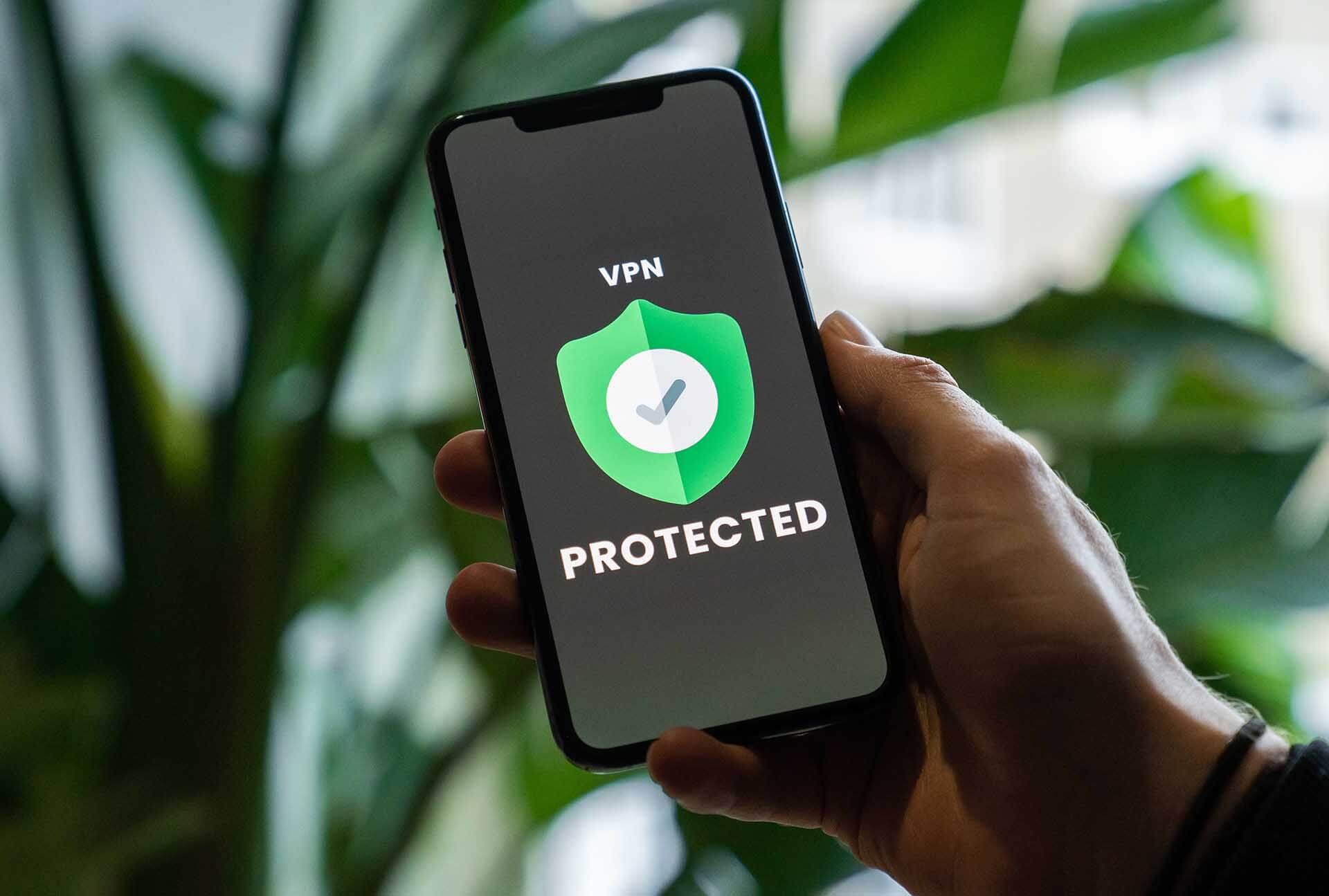If you’re serious about cryptocurrency trading, then you know how important it is to manage risk. As technology evolves and tokens fluctuate rapidly, one of the few things that traders can control is the security of their transactions.
A Virtual Private Network (VPN) is one of the best ways to protect your trading activities. A VPN encrypts your internet traffic and routes it through a secure server, making it virtually impossible for anyone to hack your device or steal your data.
To take your cryptocurrency trading to the next level, be sure to protect yourself with a VPN service that meets your specific needs. As you look for the best VPN for crypto trading, consider key factors such as security protocols, server locations, and speed.
Our detailed review of the 7 best VPNs for cryptocurrency trading was designed to simplify your search. We closely examined the advanced security features of each platform to help you find a reliable VPN provider for your crypto transactions.
What is a VPN?
A VPN or Virtual Private Network is a service that provides a secure pathway between users and the internet. A VPN service encrypts users’ data and changes their IP address to stop third parties, like ISPs and governments, from snooping or censoring online activities.
VPNs also promote internet privacy. By masking IP addresses, VPN providers enable users to securely use torrents, bypass censorship setbacks, and visit platforms that would otherwise be inaccessible.
Why use a VPN for crypto trading?
A VPN offers several benefits to crypto traders.
First, and perhaps most importantly, a VPN provides an extra layer of security to crypto trading. It encrypts your data and hides your true IP address so that you can buy and sell cryptocurrencies anonymously. It also helps to protect your hot crypto wallet by guarding you against malware, viruses, and phishing attacks.
Second, a VPN allows you to connect to crypto exchanges that are inaccessible in your locality. With a VPN service, you can change your IP address and make it appear to crypto trading platforms that you are located where they are available.
However, not all VPNs are ideal for crypto trading. After weighing the pros and cons of each service, here are our top 7 VPN picks for crypto trading in 2024.
Best VPNs for Crypto Trading: Quick List
- NordVPN: Overall best VPN for crypto trading
- ExpressVPN: Best for connection speed
- CyberGhost: Longest money-back guarantee
- SurfShark: Best for server security
- Private Internet Access: Largest server network
- PrivateVPN: Best for accessing European based DEXs
- IPVanish: Best for avoiding rented servers
Crypto VPNs: Reviewing the Top 7
1) NordVPN
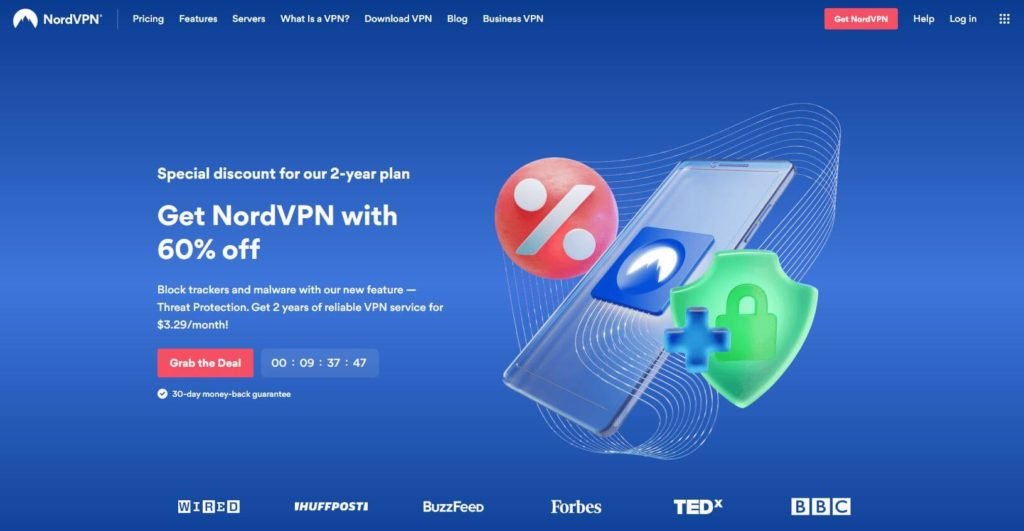
Key Features
- Over 5,400 servers in 60 countries
- Onion over VPN
- NordLynx protocol
- Accepts Ethereum and Bitcoin payments
Headquartered in Panama, NordVPN is an easy-to-use VPN with more than 5,400 servers in 60 countries worldwide. Its security features include a strict no-logs policy, AES 256-bit encryption, RAM-only servers, leak protection, Double VPN, Onion over VPN feature, and a customizable kill switch.
The Double VPN feature works by passing user data through two VPN servers instead of one. This provides double the encryption, extra IP address protection, and privacy so strong that even the internet service provider can’t monitor web activity. Onion over VPN allows NordVPN to route users’ internet traffic through the Onion network, further enhancing anonymity. The kill switch automatically disconnects users from the internet if the VPN drops, and allows users to select which apps to automatically close.
NordVPN also recently added split tunneling, letting users decide which apps will route traffic through the VPN and which will not.
NordVPN offers four protocols: NordLynx, IKEv2, OpenVPN (TCP), and OpenVPN (UDP). NordLynx is the fastest and most secure of the protocols, which is ideal for time-sensitive activities like cryptocurrency trading. Users can pay for the VPN with Bitcoin, Ethereum, PayPal, or a credit card.
Pros
- RAM-only servers
- Double VPN protection
- Customizable, automatic kill switch
- Military-grade encryption
- Split tunneling support
Cons
- Only allows up to 6 simultaneous connections
- Must sign a longer contract to lock in savings
Price
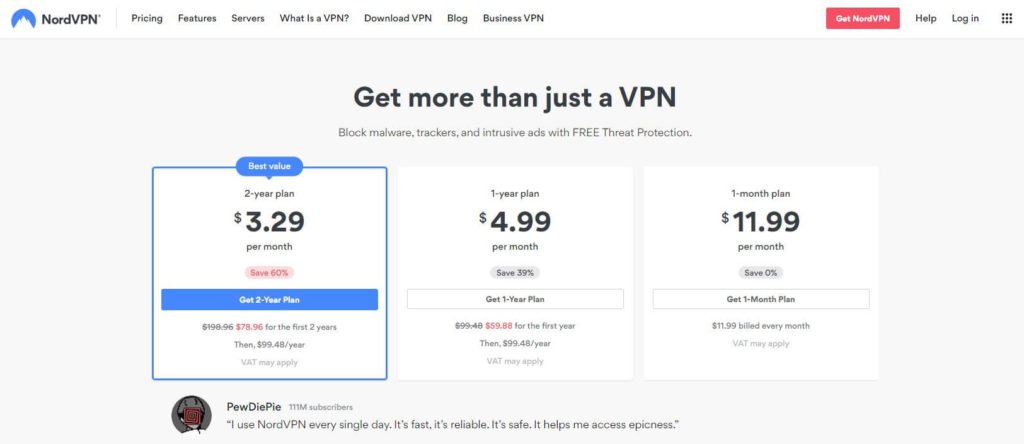
NordVPN offers three subscription plans:
- 1-month plan: $11.99 per month
- 1-year plan: $4.99 per month
- 2-year plan: $3.29 per month
NordVPN offers a seven-day risk-free trial and a 30-day money-back guarantee. If you don’t think it is the best VPN for cryptocurrency trading, NordVPN will offer you a full refund.
2) ExpressVPN
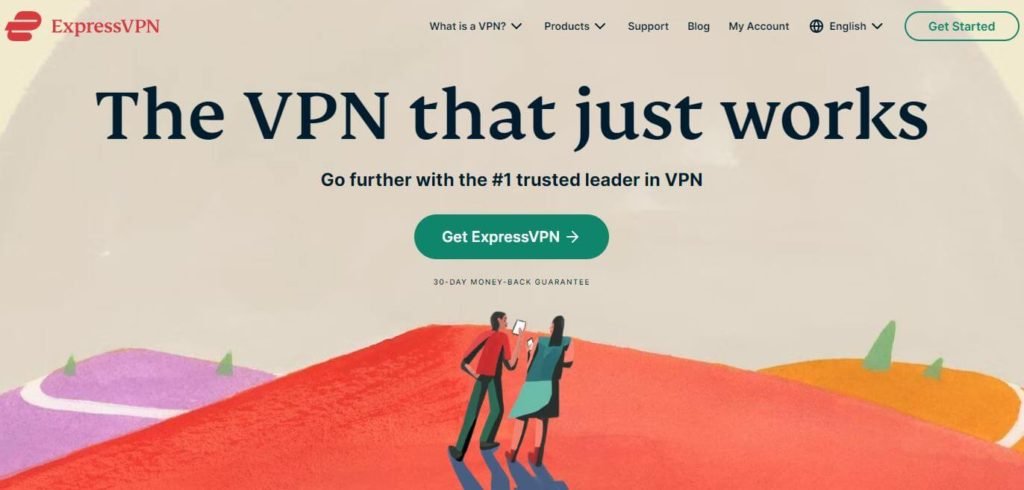
Key Features
- Over 3,000 servers in 94 countries
- Lightway protocol
- Accepts cryptocurrency payments
ExpressVPN is a reliable VPN provider with a widespread server network of more than 3,000 servers in 94 countries and 160 cities worldwide. Its security features include an automatic kill switch, AES 256-bit encryption, DNS leak protection, and RAM-only servers.
The kill switch disconnects your internet connection if the VPN drops to prevent any lapse in coverage. RAM-only servers enhance security by ensuring data is never stored on the hard drive. Instead, the server is run entirely on RAM, meaning user data is wiped after every reboot.
ExpressVPN also has a Threat Manager tool that stops websites and apps from recording users’ online activities and sharing them with third parties.
ExpressVPN offers four protocols including Lightway, OpenVPN, IKEv2, and L2TP/IPSec. Lightway is the newest, fastest, and most secure protocol on ExpressVPN, making it perfect for crypto trading. The VPN accepts credit cards, debit cards, PayPal, and Bitcoin payments.
Pros
- RAM-only servers
- AES 256-bit encryption standard
- Automatic kill switch
- 24/7 customer support
Cons
- Only allows up to 5 simultaneous connections
- One of the most expensive options
Price
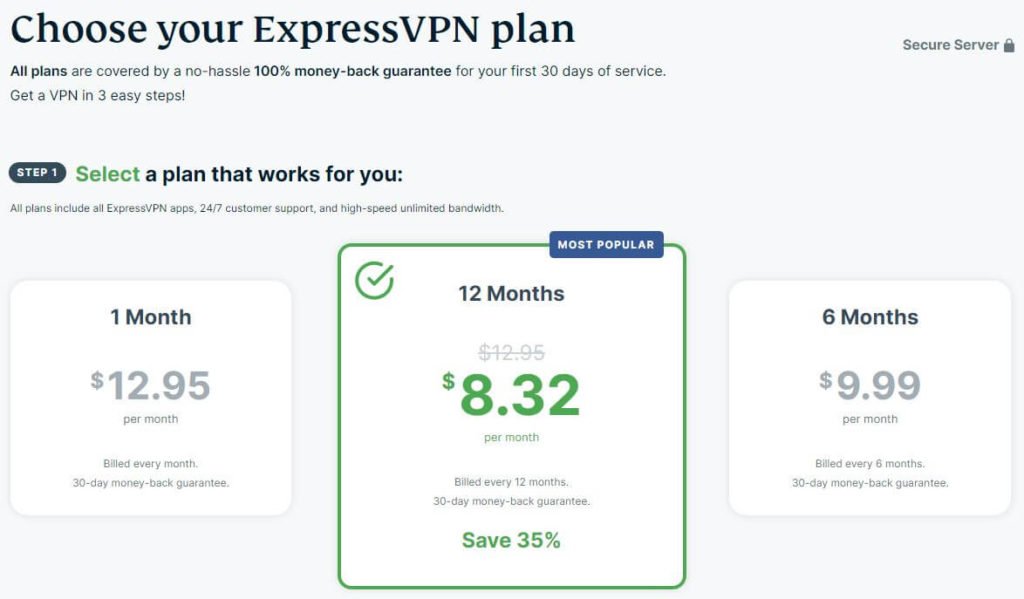
ExpressVPN offers three subscription plans:
- 1-month plan: $12.95 per month
- 6-month plan: $9.99 per month
- 12-month plan: $8.32 per month
There is also a 30-day money-back guarantee if ExpressVPN isn’t the best crypto trading VPN for you.
3) CyberGhost

Key Features
- Over 8,000 servers located in 91 countries
- Perfect Forward Secrecy
- WireGuard protocol
- Accepts cryptocurrency payments
CyberGhost is a great VPN for crypto trading due to its strict no-logs policy, AES 256-bit encryption standard, kill switch, and DNS leak protection.
Many of CyberGhost’s 8,000+ servers are owned directly by the VPN service. These NoSpy servers feature top-of-the-line hardware for ultimate privacy, security, and performance.
The VPN also offers Perfect Forward Secrecy, meaning it frequently changes encryption keys to avoid security compromise.
CyberGhost supports three VPN protocols: IKEv2, OpenVPN, and WireGuard. While IKEv2 and OpenVPN are widely respected as the most secure protocols in the industry, WireGuard is quickly gaining traction. With improved encryption techniques and faster speeds, it’s a popular choice among crypto enthusiasts.
CyberGhost accepts payment via credit card, PayPal, and crypto.
Pros
- NoSpy servers offer enhanced privacy, security, and performance
- AES 256-bit encryption standard
- Automatic kill switch
Cons
- Only allows up to 7 simultaneous connections
- Must sign a longer contract to lock in savings
- Not all servers are in-house
Price
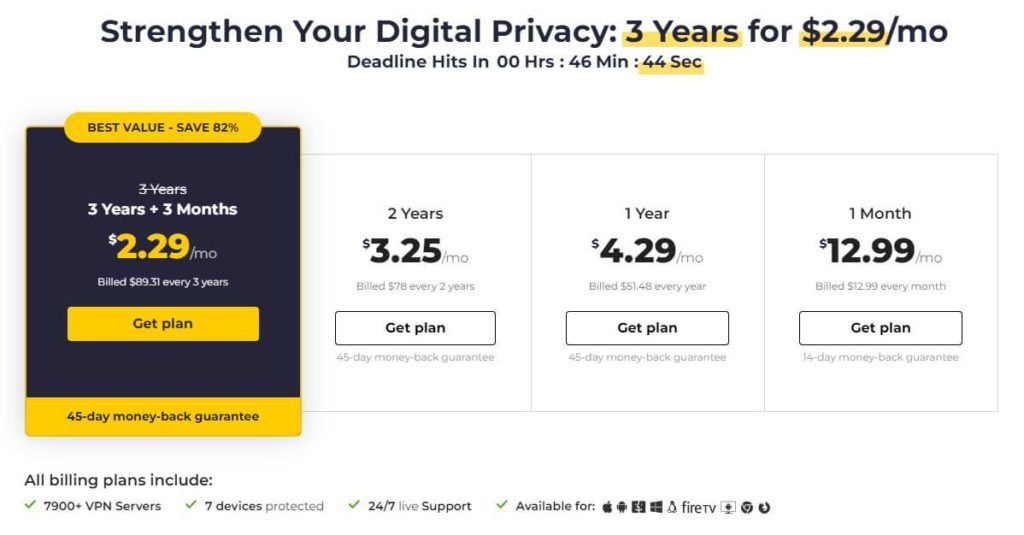
CyberGhost offers four subscription plans:
- 1-month plan: $12.99 per month
- 1-year plan: $4.29 per month
- 2-year plan: $3.25 per month
- 3-year plan: $2.29 per month
All packages come with a 45-day money-back guarantee if CyberGhost isn’t the right crypto trading VPN for you.
4) Surfshark
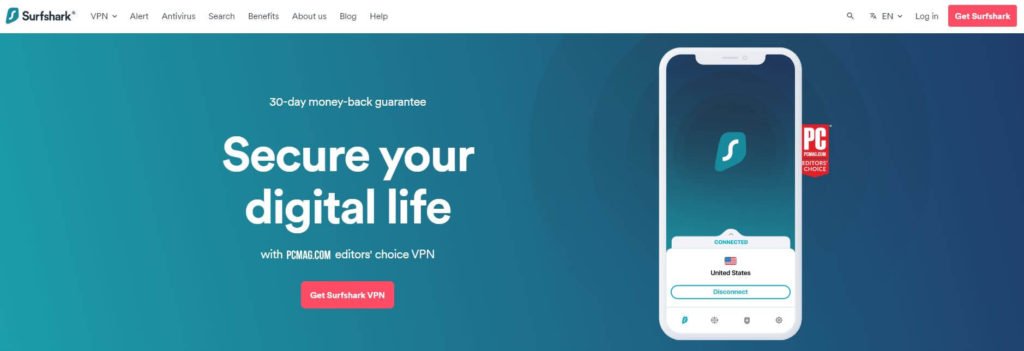
Key Features
- Over 3,200 servers in 65 countries
- Multihop security feature
- WireGuard protocol
- Accepts cryptocurrency payments
Surfshark is a fast, secure, and feature-rich VPN that stands out with its unlimited simultaneous connections. It has over 3,200 servers located in 65 countries across the globe, and its security features include an integrated antivirus tool, NoBorders, camouflage mode, MultiHop, and Cleanweb.
The NoBorders feature allows users to access the VPN in heavily restricted countries. Camouflage mode makes user traffic appear like regular network traffic. The MultiHop feature passes user data through two servers to enhance security, while Cleanweb blocks ads and trackers.
Surfshark’s security is enhanced using an AES-256-GCM encryption algorithm, a kill switch, and RAM-only servers. Users of the VPN have access to four VPN protocols: WireGuard, IKEv2, OpenVPN (TCP), and OpenVPN (UDP).
Surfshark accepts payment via credit or debit card, PayPal, Amazon Pay, and several cryptocurrencies through CoinGate or CoinPayments.
Pros
- Unlimited simultaneous connections
- RAM-only servers
- AES 256-bit encryption standard
- Automatic kill switch
Cons
- Must sign a longer contract to lock in savings
- No split tunneling on iOS
Price
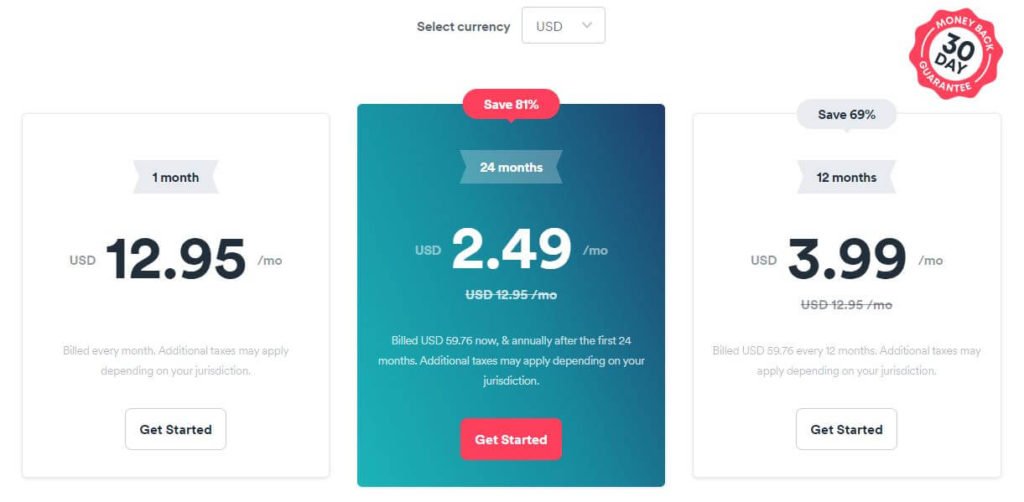
Surfshark offers three subscription plans:
- 1-month plan: $12.95 per month
- 12-month plan: $3.99 per month
- 24-month plan: $2.49 per month
Surfshark offers a 30-day money-back guarantee if it is not the best VPN for your crypto trading.
5) Private Internet Access
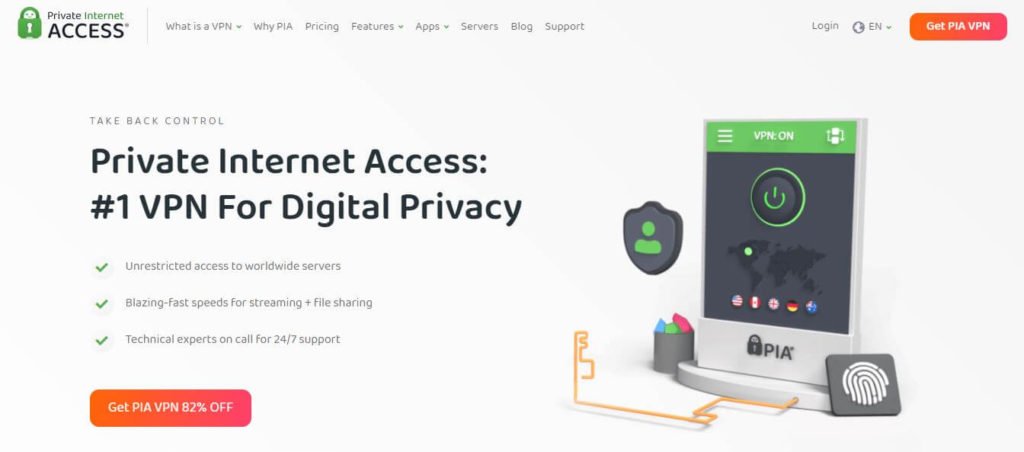
Key Features
- Over 30,000 servers located in 78 countries
- WireGuard protocol
- Accepts cryptocurrency payments
Private Internet Access (PIA) has a massive server network of more than 30,000 servers across 78 countries worldwide. It is an easy-to-use platform that is compatible with most operating systems, including Windows, Linux, Mac, and Android.
PIA features AES-256-GCM encryption, a kill switch, and leak protection. Users of the VPN have access to three VPN protocols: WireGuard, OpenVPN (TCP), and OpenVPN (UDP). PIA accepts credit or debit cards, PayPal, Amazon Pay, and cryptocurrencies like Bitcoin, Ethereum, Litecoin, and Bitcoin Cash.
A major concern about PIA is the location of its headquarters. PIA operates out of Denver, Colorado in the U.S. As a member of the Five Eyes Alliance, the U.S. has the legal power to obtain consumer information from companies within its borders. PIA, however, insists that they maintain a no-logs policy.
Pros
- AES 256-bit encryption standard
- Kill switch and leak protection
Cons
- Headquartered is in the U.S., a member of the Five Eyes Alliance
- Must sign a longer contract to lock in savings
Price
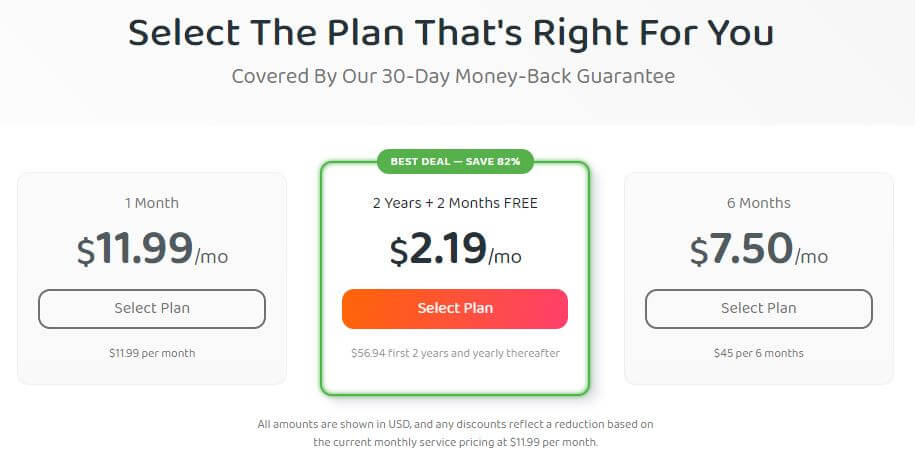
PIA offers three subscription plans:
- 1-month plan: $11.99 per month
- 6-month plan: $7.50 per month
- 2-year plan: $2.19 per month
PIA has a 30-day money-back guarantee if it’s not the best cryptocurrency trading VPN for you.
6) PrivateVPN
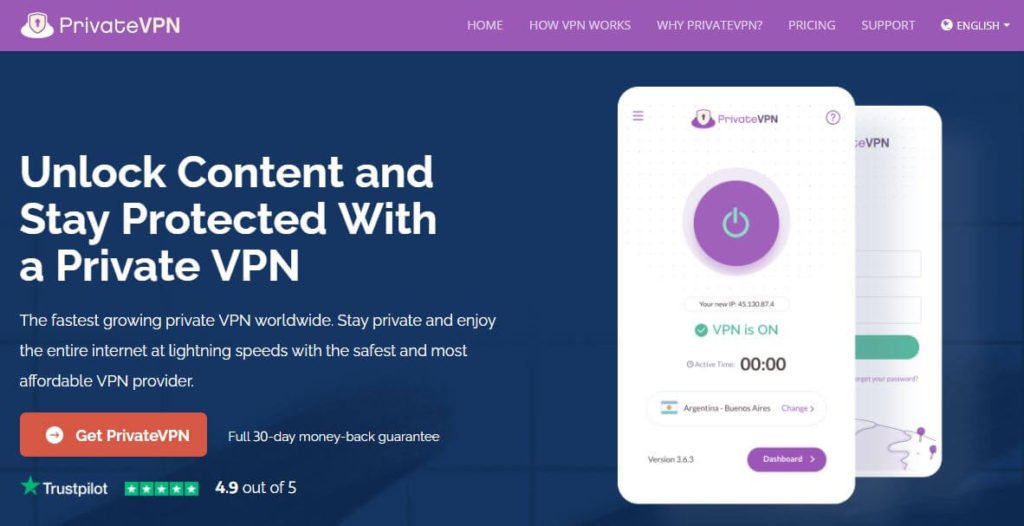
Key Features
- Over 200 servers located in 63 countries
- Port forwarding
- Accepts Bitcoin
Founded in 2013, PrivateVPN is a small but reliable VPN service. PrivateVPN maintains more than 200 servers in 63 countries, mostly concentrated in Europe. Its most important security features include DNS leak protection, a kill switch, and port forwarding.
Unlike most VPNs, PrivateVPN allows users to customize encryption levels. Users can choose among four encryption standards: AES-256-CBC, AES-256-GCM, AES-128-CBC, and AES-128-GCM. PrivateVPN supports standard VPN protocols like OpenVPN, L2TP/IPsec, PPTP, and IKEv2, and accepts payment via PayPal, Stripe, and Bitcoin.
A key drawback of PrivateVPN is the location of its headquarters. Based in Sweden, PrivateVPN operates in a country that strictly enforces data retention laws. However, PrivateVPN claims they have a no-logs policy.
Pros
- Four choices of encryption standards
- Kill switch and leak protection
- Allows up to 10 simultaneous connections
Cons
- Based in Sweden, a member of the Fourteen Eyes Alliance
- Small server network
Price
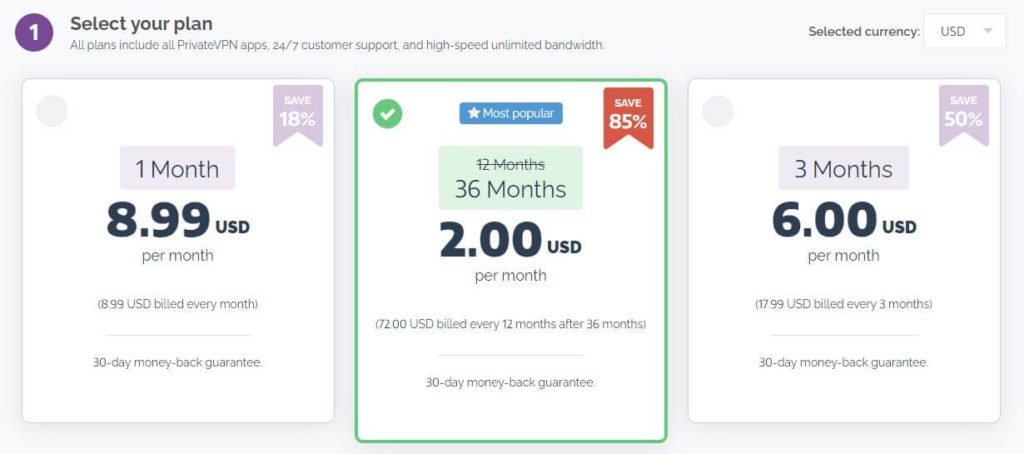
PrivateVPN offers three subscriptions plans:
- 1-month plan: $8.99 per month
- 3-month plan: $6.00 per month
- 36-month plan: $2.00 per month
PrivateVPN offers a seven-day free trial run and a 30-day money-back guarantee if you determine it is not the best VPN for crypto trading.
7) IPVanish
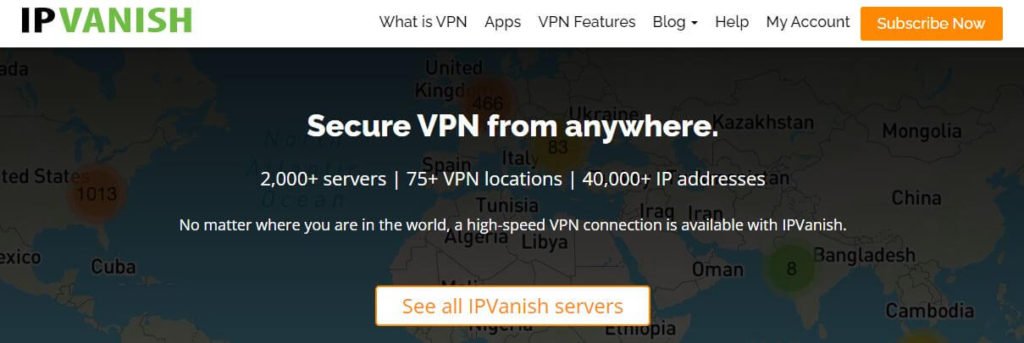
Key Features
- Over 2,000 servers across five continents
- IPVanish owns their servers
- WireGuard protocol
IPVanish is another great VPN that features a network of more than 2,000 servers, mostly concentrated in North America and Europe. IPVanish owns all of its servers, eliminating the risks that arise from rented servers.
IPVanish is a reliable VPN service that uses 256-bit AES encryption to secure data. It also features DNS leak protection and an automatic kill switch. Users have access to all standard VPN protocols, including PTTP, L2TP/IPSec, IKEv2/IPSec, OpenVPN (TCP/UDP), and WireGuard.
While IPVanish claims to maintain a no-logs policy, the company does operate out of Florida meaning it is subject to U.S. law. The VPN provider also only accepts credit cards and PayPal for payment.
Pros
- Unlimited simultaneous connections
- No rented servers
- Kill switch and leak protection
Cons
- Based in the U.S., a member of the Five Eyes Alliance
- Must sign a longer contract to lock in savings
- Does not accept payment in cryptocurrency
Price
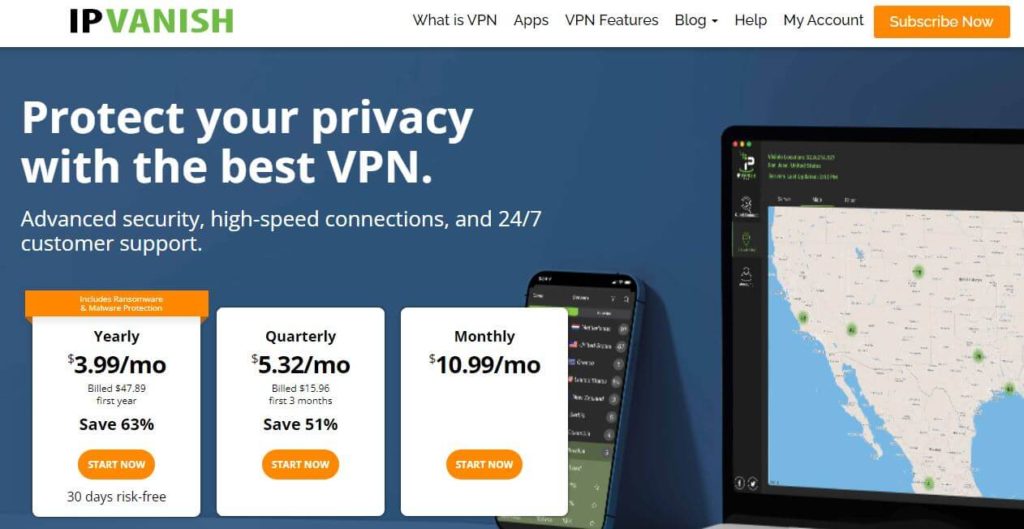
IPVanish offers three subscription plans:
- 1-month plan: $10.99 per month
- 3-month plan: $5.32 per month
- 1-year plan: $3.99 per month
There is a 30-day money-back guarantee if IPVanish does not meet your needs.
Can I purchase a VPN with cryptocurrency?
Yes, most VPN providers accept cryptocurrency as payment. In fact, the first six VPNs on our list all take crypto. While Bitcoin is the most widely supported token, several altcoins are accepted as well.
ExpressVPN, for example, accepts stablecoin, Ethereum, and Bitcoin payments. NordVPN will take payment in any token supported by CoinPayments, including BTC, BCH, LTC, BTT, DASH, ETH, TRX, XMR, ZEC, and XRP.
Cyberghost VPN accepts Bitcoin payments via Bitpay. Surfshark accepts almost anything in your crypto wallet, provided it is supported by CoinGate or CoinPayments. Private Internet Access takes Ethereum, Bitcoin Cash, and Bitcoin payments, among others. PrivateVPN accepts BTC as a form of payment.
In summary, depending on your choice of crypto trading VPN, you will most likely be able to pay with cryptocurrency to maintain your privacy.
How to use a VPN
Using a VPN is very straightforward. Once you have determined the best VPN for your cryptocurrency trading, download and install the software.
At that point, you will be required to create an account, select a subscription plan, and complete payment. To save as much as 70% per month, consider signing up for a one or two-year plan.
Most VPN providers include a 30 to 45-day money-back guarantee if you purchase a plan and are not satisfied with the service. Some, like NordVPN and PrivateVPN, even offer a seven-day free trial before committing.
After installing the VPN, launch the program and click the “connect” button. This will automatically connect you to the best server for speed and overall performance. You can then choose to switch servers to connect to crypto trading platforms or exchanges unavailable in your location.
Finally, if your VPN includes a kill switch, remember to enable and customize it. This process will ensure your privacy is never compromised, even if the VPN connection drops.
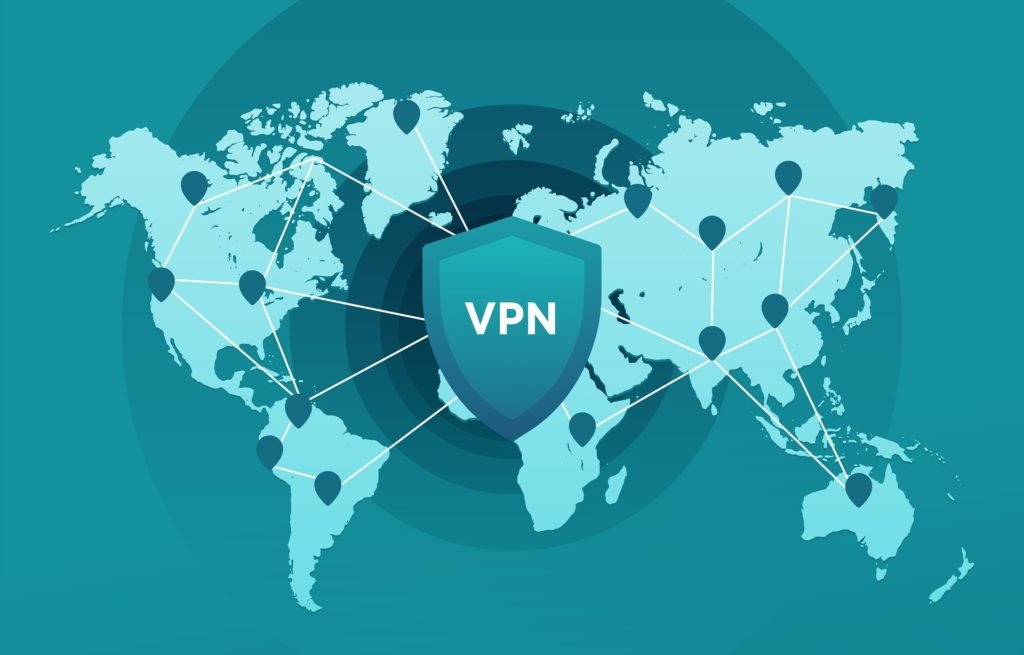
How did we determine the best VPNs for crypto trading
Encryption standard: VPNs use encryption to enhance data security. Most VPNs use the AES or Advanced Encryption Standard, which is widely regarded as impenetrable. AES is considered military-grade encryption, as even the U.S. military uses it to protect classified information.
VPNs like ExpressVPN, SurfShark, NordVPN, CyberGhost, Private Internet Access, IP Vanish, and PrivateVPN use AES-256 bit encryption standards to encrypt data. Proper encryption is a must-have for every crypto trading VPN.
Speed: Transaction speed is important in crypto trading. Several VPNs have prioritized speed without compromising security. ExpressVPN, for example, uses the Lightway Protocol, which has shown to be just as secure and up to 2.5 times faster than previous protocols.
NordVPN uses NordLynx, its own protocol which represents a speed and security upgrade from the OpenVPN protocol.
Other VPNs like SurfShark, CyberGhost, Private Internet Access, IPVanish, and PrivateVPN use WireGuard, a new protocol that is quickly gaining popularity for its blazing speed. The best VPNs for crypto trading should execute cryptocurrency transactions quickly to avoid any unnecessary slippage.
Strict no-logs policy: A no-logs or zero logs policy means the VPN provider does not store any user data. VPNs like Surfshark, NordVPN, and ExpressVPN guarantee a no-log policy by using RAM-only servers. These servers wipe out user data every time they are rebooted and ensure data is never written to the hard drive.
When evaluating zero log claims, however, keep in mind the country in which the VPN is based. VPNs like Private Internet Access, PrivateVPN, and IPVanish are well-regarded VPNs that claim a no-logs policy, but they are based in countries that are members of the Five and Fourteen Eyes Alliances. These international alliances work together to share data and monitor users’ online activity, and they have been previously exposed for unlawfully spying on their citizens.
- The Five Eyes includes: The United States, the United Kingdom, Canada, New Zealand, and Australia
- The Nine Eyes includes: The United States, the United Kingdom, Canada, New Zealand, Australia, Denmark, France, the Netherlands, and Norway
- The Fourteen Eyes includes: The United States, the United Kingdom, Canada, New Zealand, Australia, Denmark, France, the Netherlands, Norway, Germany, Belgium, Italy, Sweden, and Spain
Server network: The broader the server network a VPN has, the more likely you can connect to your desired crypto exchange as a trader. It is also better if the servers are well distributed around the world and not congested in one location. This configuration maximizes flexibility and reduces the risk of outages.
Private Internet Access has over 30,000 servers across 78 countries, and CyberGhost boasts over 8,000 servers in 91 countries. ExpressVPN has fewer servers (over 3,000) than Private Internet Access and Cyberghost, but in more localities (94 countries).
Leak-proof: A DNS leak is a security problem that affects online privacy even when using a VPN. A leak causes DNS requests to move outside of a VPN’s encrypted tunnel, allowing them to be seen by internet service providers.
VPNs like ExpressVPN, SurfShark, NordVPN, CyberGhost, Private Internet Access, IPVanish, and PrivateVPN assure leak protection.
Kill switch: A kill switch is a security feature that, when enabled, disconnects your device from the internet any time your VPN drops.
The kill switch feature ensures your data privacy is never compromised, even when the VPN is not working. Most VPNs, including ExpressVPN, SurfShark, and NordVPN, offer a kill switch.
Device compatibility: Crypto trading can easily take place on mobile, desktop, or tablet. No matter where you conduct your cryptocurrency transactions, your VPN should be there to protect you. While most VPNs work across all major operating systems (Windows, Linux, macOS, Android, and iOS), confirm that your VPN covers all of your devices.
Customer support: The best VPNs offer fast and timely customer service. ExpressVPN, NordVPN, CyberGhost, and SurfShark all have responsive 24/7 customer support systems.

Are there any risks in using a VPN?
There are a few risks to bear in mind when deciding the best VPN for crypto trading. These risks include:
Data logs: Many VPN service providers claim a zero log policy, but operate in countries with data retention laws. These VPN providers can easily be forced to turn over user data. As you search for the best VPN for crypto trading consider checking where the VPN is based and whether it has ever exposed user data.
Data leaks: Most paid VPNs are protected against data leaks. However, free VPNs are more easily compromised due to their lower security levels. Plus, many free VPNs store and sell user data to monetize their free service. As a result, the consequences of a data leak from a free VPN can be much more consequential depending on their logs policy.
Security tips for crypto traders
Faster isn’t always better: In the volatile world of crypto trading, speed is king. But this speed cannot come at the cost of security. When selecting a VPN for crypto trading, first seek maximum protection and then optimize for speed.
Rather than risk a security breach, opt for a proven protocol with strong encryption techniques. Lightway and NordLynx, for example, are both proven to be faster and more secure than their predecessors.
Enable the kill switch: The kill switch is a vital feature when using a VPN for crypto trading. When accessing trading platforms that may not be available in your area, this switch can protect your account from exposing your IP address if the VPN were to disconnect. With the switch activated, your privacy and security are always maintained
Popular crypto trading platforms
Coinbase
Coinbase is a U.S.-based crypto exchange that accepts traders from all 50 states in the U.S. and 32 countries worldwide. Founded in 2012, Coinbase is one of the largest and most trusted crypto exchanges.
Coinbase is easy to use and highly secure. It supports more than 150 cryptocurrencies, and recently released its own crypto wallet. Users can fund their crypto transactions with a bank account, debit card, money wire, or PayPal.
Coinbase also offers two trading platforms, the standard Coinbase platform for beginners and Coinbase Pro for advanced traders. Fees on the standard platform are high when compared to other crypto exchanges.
Gemini
Founded in 2015, Gemini is another U.S.-based crypto exchange designed for beginner and advanced crypto traders. It operates in all 50 U.S. states and over 60 countries worldwide.
Gemini supports over 80 cryptocurrencies with its simple user interface. Traders can access the crypto exchange with a crypto wallet, or a wide number of fiat-based payment options.
Like Coinbase, Gemini imposes relatively high fees to trade crypto. However, many users embrace this cost for the mainstream appeal and perceived safety of such a large platform.
Kraken
Kraken is a reputable U.S.-based crypto exchange that has been in operation since 2011. It is available to crypto traders in all U.S. states except New York and Washington, and 176 countries worldwide.
Kraken is one of a few crypto trading platforms tailored to more experienced traders. It offers advanced features, like margin trading, stop orders, and short sales.
Kraken supports the trading of more than 90 cryptocurrencies, and several fiat currencies. Its fees on cryptocurrency transactions tend to be lower than those of Coinbase and Gemini.
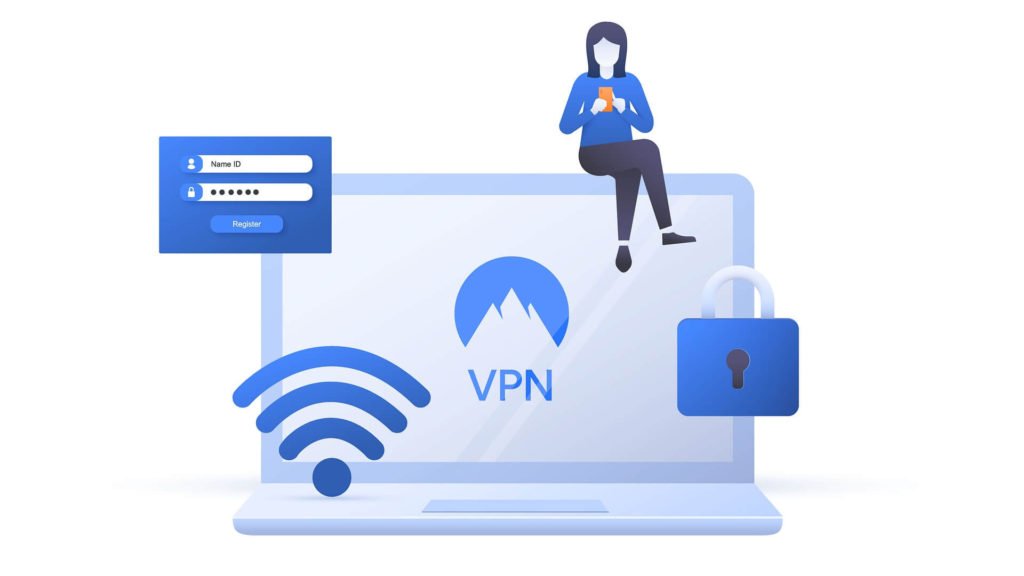
VPN Frequently Asked Questions (FAQs)
Is it legal to use a VPN to trade cryptocurrencies?
It is legal to use a VPN for crypto trading in the United States, however, it could be against the terms and conditions of the exchange you use. Before performing any cryptocurrency transactions using a VPN, confirm that doing so won’t jeopardize your account status.
While the majority of western countries accept the use of VPNs, several more authoritarian governments, like China and Russia, have banned their use. And other countries, like Bolivia, Egypt, and China, have banned cryptocurrencies altogether. So whether you can use a VPN for cryptocurrency trading does depend on your location.
Can I use a VPN with a DEX?
Yes, VPNs can be used with decentralized exchanges. Using a VPN for cryptocurrency transactions on a DEX is a wise way to add an extra layer of protection while trading.
Which VPNs accept payment in crypto?
Several VPNs, including ExpressVPN, NordVPN, SurfShark, CyberGhost, and Private Internet Access, accept crypto as a form of payment.
When paying with crypto, most VPNs will not ask for any personal information other than an email address. By accepting payment in crypto, VPNs further support internet privacy.
What are the benefits of using a VPN when trading crypto?
Cryptocurrency trading can be a risky endeavor. By using a VPN, crypto traders can help protect their identity and transactions from potential cyber threats. VPNs encrypt internet traffic, making it more difficult for hackers to intercept data.
In addition, VPNs can be used to bypass geographic restrictions and access global crypto exchanges. A VPN can hide your IP address to allow you to transact even within countries that don’t allow crypto trading.
And as mentioned previously, some VPNs accept payment in cryptocurrency helping to preserve anonymity.
Whether you’re a beginner or an experienced trader, using a VPN is a smart way to help protect your crypto transactions.
Can I use a free VPN for crypto trading?
Using a free VPN is a great way to learn about VPNs and test how they work. However, free VPNs are not the safest option for crypto trading in 2024.
Many free VPNs offer less protection, fewer security features, and store user data. The best VPNs for crypto trading offer greater DNS leak protection, a zero logs policy, and a kill switch.
What is the best VPN for crypto trading?
The best VPN for crypto trading is NordVPN. We compared the speed, advanced security features, and price of the most popular VPN services to determine our recommendation.
While NordVPN is our overall winner, choosing the best VPN for crypto trading is a personal decision that comes down to your preferences, risk tolerance, and budget.
Private Internet Access VPN, for example, has more servers than any other VPN we evaluated. However, the VPN is based in the U.S., which could pose a risk given its inclusion in the Five Eyes Alliance.
ExpressVPN, NordVPN, and SurfShark, on the other hand, all have fewer servers but the servers are RAM-only. For those concerned with privacy, this feature is likely worth paying for. But for those simply seeking increased security, the best VPN might be more focused on encryption and double VPN features.
To get started with the right solution for your trading, determine your must-have features and review our summary of the best VPNs for crypto trading above.
